Toothache is something that most of us will experience at some point in our lives, for one reason or another. There are many things that can cause tooth pain, but when it happens to you, all you really want to know is how to treat your toothache.
In this article we look at what causes different types of tooth pain, how to get rid of toothache if you’re in pain right now, and what treatment you might need to stop it altogether.
We also have some tips for preventing painful tooth and gum problems in the future.
In This Article
- 1 Is it an emergency?
- 2 What causes toothache?
- 3 Pain from tooth infection or decay
- 4 Wisdom tooth pain
- 5 Broken / cracked tooth pain
- 6 Toothache after filling or other dental work
- 7 Sinus toothache with a cold
- 8 Toothache in pregnancy
- 9 Toothache at night
- 10 How to get rid of toothache
- 11 How to cure toothache: summary
- 12 Tooth pain FAQs
Is it an emergency?

If you’re reading this article because you or someone you know has a toothache right now, check for other symptoms that are a sign of something more serious. You should go to A&E if you have any of the following as well as toothache symptoms:
- Swelling around your eyes or neck
- Swelling in your mouth or throat that’s making it difficult for you to talk, breathe or swallow
- Bleeding that won’t stop
If you have severe tooth pain and feel like you need to see a dentist ASAP, we have a separate guide about what constitutes a dental emergency and how to find an emergency dentist near you.
For less severe toothache, you might still need to see a dentist but there are plenty of tooth pain relief options you can try in the meantime. More on those later, but first let’s understand the various toothache causes that might be at the root of the problem.
What causes toothache?
There are a number of different toothache causes we’re going to look at here. Dental pain is often the result of tooth decay, either directly or indirectly. You might also have painful wisdom teeth. Sinus tooth pain or tooth damage from an injury are other possibilities. Plus, it’s common to experience toothache or sensitivity after a filling, extraction or other dental work.
Below you can read about the different causes of toothache and what you can do to help get rid of tooth pain in each case. If you are experiencing sensitivity when you eat or drink certain things, rather than a constant or throbbing tooth pain, our article on dentin hypersensitivity may be more relevant to you.
Pain from tooth infection or decay
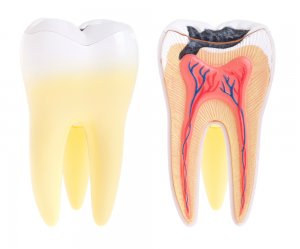
Teeth consist of three layers. The inner part, called pulp, contains the nerves and blood vessels. This is surrounded by a layer of dentin, and then the outer layer of strong, hard enamel, which protects everything within.
Failure to maintain good oral hygiene allows bacteria and plaque to build up on the tooth surface, leading to decay. Once decay erodes a hole in the enamel and reaches the dentin, the tissue becomes inflamed as your body fights the infection, resulting in a sensitive or painful tooth. Tooth decay will continue to spread unless treated, and if it reaches the nerves in the tooth pulp it can cause more severe toothache from pulpitis.
If you notice some discolouration on your tooth or you can feel a hole, these are signs you have tooth decay. You can read more about tooth decay symptoms, causes, and treatment here.
Tooth abscess pain
Untreated decay can eventually lead to a gum or tooth abscess – a pocket of puss that forms because of bacterial infection. The video animation below shows how decay spreads to cause dental pain and infection:
Abscesses can be extremely painful, usually causing throbbing tooth pain that comes and goes or remains constant.
If you have a dental abscess you might also find that:
- You have swelling in your face or gums
- Pain increases when the tooth is exposed to hot or cold
- Your tooth hurts when tapped
- It hurts when you eat
- You have pain in your jaw
- You experience earache or headache
If you have a bad toothache along with any of these symptoms, it’s definitely time to get to a dentist. You’ll find lots more information about this problem in our article on dental abscesses.
What to do about it
If you think your toothache is caused by decay, you should make an appointment to see your dentist. If caught early enough, a simple tooth filling is enough to remove the decay and restore the tooth. Once decay spreads further it may require root canal treatment or a crown – or extraction if the tooth is very badly damaged – so it’s worth getting to a dentist sooner rather than later.
While you await treatment, you can take painkillers or other medicines to keep any pain under control. We have another guide with some more suggestions for how to get rid of toothache at home.
If you have severe, throbbing tooth pain and you think you have an abscess, you may need to make an urgent appointment to receive emergency toothache relief and perhaps dental antibiotics. Regular painkillers might not be enough to soothe tooth infection pain.
Note that even if bad toothache pain subsides by itself, it’s still a good idea to visit a dentist. You may still have a tooth infection that needs to be treated before it causes an abscess.
Wisdom tooth pain
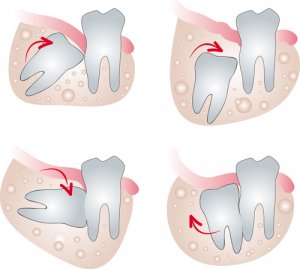
Wisdom teeth, also known as third molars, are a source of back tooth pain for some people.
These teeth are located right at the back of your mouth and they sometimes don’t have enough space, which causes them to become impacted. An impacted tooth can’t erupt properly and instead pushes against the neighbouring tooth. This in itself can cause tooth or gum pain, but it also increases the risk of infection.
Even if your wisdom teeth erupt naturally, you might experience some gum pain at the back of your mouth where the tooth is pushing through.
What to do about it
Visit your dentist. If an impacted wisdom tooth is painful or infected, it might need to be extracted. Your dentist will take x-rays of your mouth to check the position of any problem teeth and will advise you of the best course of action.
To soothe pain from an erupting tooth, use a topical oral anaesthetic gel.
You can find out more about wisdom teeth problems and treatments in our separate guide.
Broken / cracked tooth pain
Cracked or broken teeth can be very painful, especially if the tooth nerves are exposed. Teeth can crack or break for a number of reasons, including:
- Damage from tooth decay
- Old fillings
- Biting down on something hard
- An injury to the face or mouth
You’ll be able to see or feel a crack in your tooth, or feel a part of it come away.
How to stop a toothache from a broken tooth
Painkillers might help with the pain but you can make an emergency dental appointment if you need stronger pain relief. It’s important to get a broken tooth repaired or treated ASAP, even if the pain subsides. Avoid eating on that tooth in the meantime, since this will increase tooth nerve pain and may cause further damage. The deeper a crack goes, the less likely the tooth can be rescued.
Keep any broken pieces of tooth, if you have them. This will help your dentist match any reconstructions to the original shape. Use chewing gum or orthodontic wax to cover any sharp bits of tooth in your mouth that might cut your tongue or gum. We have a separate page with more advice on dealing with a cracked or broken tooth.
Toothache after filling or other dental work
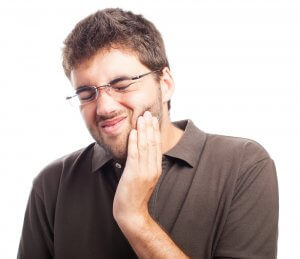
It’s fairly common to feel some sensitivity or tooth pain after a filling, root canal treatment, or crown or bridge fitting. The dentist has altered the structure of your tooth, and once any anaesthetic has worn off it can still take some time for your mouth to recover and for any swelling to subside.
Your dentist may give you some painkillers to take for a few days after your treatment.
Contact your dentist if:
- You’re in severe pain following dental work
- The pain continues for several days
- The pain starts getting worse
Otherwise, it should soon feel much better.
Pain after tooth extraction
One potential complication to be aware of is a condition called dry socket, which can occur after a tooth extraction.
Following an extraction, a blood clot forms in the socket to protect the bone and nerves while the gum heals over. If the clot becomes dislodged before this healing is complete, the exposed nerves will be extremely painful. This is more likely to happen with molar extractions where the socket is larger.
If you experience strong throbbing pain after a tooth extraction, you might have dry socket. Contact your dentist straight away – they will clean and dress the wound and give you pain medication.
Read our article how to avoid dry socket and the symptoms to look out for.
Sinus toothache with a cold
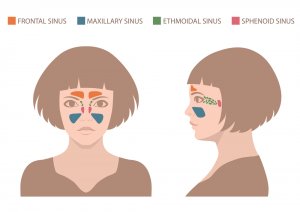
Have you ever noticed that you get aching teeth when you have nasal congestion? If you get a toothache with a cold, it’s probably because your sinuses or nasal cavities are swollen, putting pressure on your upper jaw.
Congested sinuses can also cause pain around your eyes or elsewhere in your head.
How to ease sinus tooth pain
Sinus toothache is usually dull rather than sharp, but it might get worse at night when you lie down. Using an extra pillow to lift your head higher should help ease the pressure. You can also use decongestant medicines to help clear your nose and sinuses.
Toothache in pregnancy
Pregnant women are at increased risk of tooth decay and gum disease because of changes to their hormones. To add to this, vomiting from morning sickness coats the teeth in acid which erodes enamel. This can cause overall tooth sensitivity and front tooth pain in particular.
To minimise the chances of toothache in pregnancy, it’s important to continue regular dental checkups and pay special attention to your oral hygiene during this time.
Toothache at night
Any of these kinds of toothache can feel worse at night. This is because when you lie down, the blood pressure in your head increases and puts increased pressure on areas that are already inflamed and sensitive.
To help a toothache at night, try elevating your head with one or two extra pillows while you sleep. This is not a toothache cure but it should help relieve your discomfort while you seek appropriate treatment.
How to get rid of toothache

We can say that in almost every case, the best thing for a toothache is a trip to the dentist. Very few of the underlying causes of toothache can be cured at home, although you can take medicines to relieve the pain.
The toothache treatment you receive at the dentist will depend on what’s causing the pain and how serious any tooth damage is. Treatment might involve:
- Strong painkillers (such as tramadol)
- Antibiotics
- A filling
- Root canal treatment
- A dental crown
- Tooth extraction
When to see a dentist about teeth pain
The advice from the NHS is to visit a dentist if:
- Your toothache lasts more than two days
- Painkillers like ibuprofen and paracetamol don’t help
- You have a high temperature
- Your tooth hurts when you bite down or touch it
- You have red gums
- There’s a bad taste in your mouth
- Your cheek or jaw are swollen
Perhaps you’re putting off visiting a dentist to treat your tooth pain because you’re worried about the treatment itself. Be assured that modern dental anaesthetics are designed to stop you feeling any pain during your treatment. If you’re particularly anxious, find a dentist who specialises in treating nervous patients and ask about getting IV dental sedation.
The important thing is that you receive the treatment you need to stop your toothache and treat the problem before it gets worse. And whatever you do, don’t try to pull your own tooth at home.
Emergency toothache relief
If you have bad toothache which needs urgent treatment, make an emergency appointment (out of hours, if necessary). The dentist may treat your tooth right away, or they may give you medicine to relieve the pain until you can receive complete treatment.
Dentists can administer strong painkillers for emergency toothache relief when you’re experiencing severe tooth pain. If you have a tooth infection, you may get antibiotics too.
In cases where you have a broken tooth or a crown or filling has come loose, a DIY temporary filling kit might help ease the pain too.
Dental pain relief at home
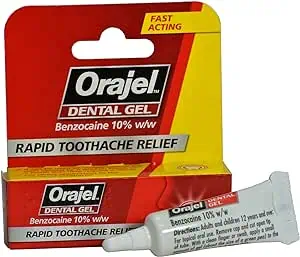
Because it’s not always possible to get a dental appointment straight away, you might need to treat your toothache at home for a while. Over-the-counter painkillers should provide some relief from tooth pain, and you can also buy special gels and ointments with anaesthetic and anti-inflammatory properties.
For example, Orajel dental gel is the UK’s number one selling toothache brand, designed to get rid of tooth pain fast. You just apply it directly to the painful tooth and gum area every few hours for quick pain relief.
There are various natural remedies that offer tooth pain relief, too. You can apply clove oil to the sore teeth and gums or rinse your mouth with salt water periodically.
Meanwhile, you can stop toothache getting any worse by avoiding the following things which can aggravate sore teeth:
- Hot and cold foods and drinks
- Anything very sugary, acidic or spicy
- Hard, crunchy or chewy foods
- Chewing on or near the painful tooth
- Smoking
If you have a severe toothache, many home remedies will not work because the problem is with a deeper injury or infection. However, if you have a minor toothache, there are a few at-home remedies you can try to soothe the pain:
- Try switching to a toothpaste for sensitive teeth; this helps coat your teeth to prevent sensitivity to hot or cold food and drinks
- Swish warm salt water around your mouth
- Take an over-the-counter pain medication, like ibuprofen
- Avoid acidic foods and drinks, such as carbonated drinks
- Use a sensitive mouthwash to further coat your teeth
- Place an ice pack over the painful side of your mouth to help lessen the ache
Dr. Robert Berry, Mountain Aire Dentistry
How to cure toothache: summary
The table below shows a summary of all the tooth pain problems we’ve mentioned, as well as what to do about them.
Toothache cause/type/symptom | Symptoms | Recommended treatment |
Tooth decay | Any kind of tooth pain; perhaps visible discolouration or hole in tooth | Visit a dentist; use home pain relief in the meantime |
Abscess/infection | Severe, maybe throbbing pain; swelling; bad taste or smell; pain spreading to other parts of the head | Visit a dentist ASAP; use home pain relief in the meantime |
Wisdom tooth | Pain at back of mouth | Visit a dentist for x-rays; may require extraction |
Broken/cracked tooth | Part of tooth broken off or a crack you can see or feel | Visit a dentist ASAP; avoid eating on that tooth |
Following dental work | Swelling and pain following filling, root canal, etc. | Use home pain relief; speak to your dentist if no improvement in 2-3 days or if pain worsens |
Dry socket | Sharp, throbbing pain 1-5 days after tooth extraction | Visit your dentist ASAP |
Sinus tooth pain | Toothache with a cold or congestion | Use a decongestant and home pain relief if needed |
Toothache at night | Tooth pain only at night or worse at night | Elevate head while sleeping; visit a dentist unless caused by a cold |
Tooth pain FAQs
Still have specific questions about toothache causes, symptoms and remedies? Take a look below…
What’s the best way to get rid of toothache?

Except in the case of sinus tooth pain caused by a cold, the best thing for toothache is a trip to the dentist. Ibuprofen, other medicines and natural remedies offer relief from aching teeth, but they won’t treat whatever is causing the problem.
Can toothache cause a headache?
Yes, in some cases. Toothache pain can feel like it’s spreading to your head, face, eyes or ears, especially when it’s caused by infection or sinus congestion. It’s quite common to experience toothache, headache and earache all together.
You might be grinding your teeth without realising – either as a result of toothache or because of a condition called bruxism. Common tooth grinding symptoms include headaches and jaw pain.
What does it mean if I have toothache and earache?
Experiencing a toothache and earache together might mean you have a problem with one of your upper back teeth. It could be an impacted wisdom tooth, or decay or infection in a molar, for example. It could also be nasal congestion causing the pain, but if you don’t have any signs of a cold, you should visit a dentist to have the problem checked out.
What should I do about tooth crown pain?
It’s normal to experience some sensitivity after having a dental crown fitted, just while the swelling around your tooth and gum subsides. Sometimes an adjustment is needed for a better fit. If your crown is still causing you pain after a couple of days, especially when you bite down, mention it to your dentist.
Pain from an old tooth crown is a sign that the tooth below could be decaying further, so your dentist will need to check this.
How long does pain last after tooth extraction?
Pain after tooth extraction shouldn’t last for more than a day or two, depending on how complicated the extraction was. Some people don’t experience any pain once the anaesthetic has worn off. Your dentist might give you painkillers to control any tooth extraction pain, or you can take ibuprofen or paracetamol to help.
If you start experiencing severe, throbbing tooth pain 1-5 days after an extraction, speak to your dentist straight away. This is a sign of dry socket, a condition that will require extra treatment.
Why is my toothache worse at night?
A toothache can feel worse at night because when you lie down, the blood pressure in your head increases, including on the areas around your tooth which are already inflamed and painful. Elevating your head with a pillow can help decrease the discomfort of a toothache at night.
Why do my teeth hurt when I have a cold?
You might experience a sinus toothache when you have a cold because your sinuses are enlarged. This is not a sign of problems with your teeth; your sinus cavity is putting pressure on your tooth root.
Why do I have throbbing tooth pain that comes and goes?
Toothache can manifest itself in different ways. You might feel constant sharp pain or a dull throbbing tooth pain comes and goes in waves. In any case, it’s not much fun to live with. You should get to see a dentist as soon as possible.
What does it mean if all my teeth hurt on one side?
If you experience tooth pain on one side, it may be due to teeth grinding and an uneven bite. Or, it could be that one of the teeth on that side is infected and the pain is radiating outwards.
NHS. Toothache. Consulted 12 March 2019
Oral Health Foundation. Dental decay. Consulted 12 March 2019
Bupa Dental. How to handle a toothache. Consulted 12 March 2019





